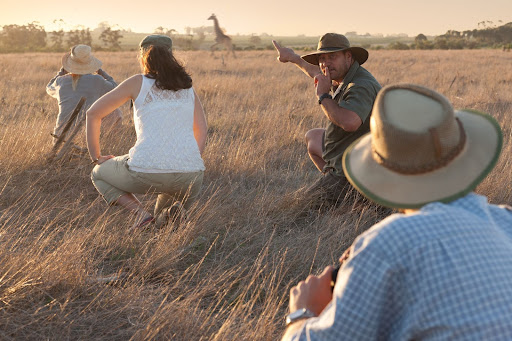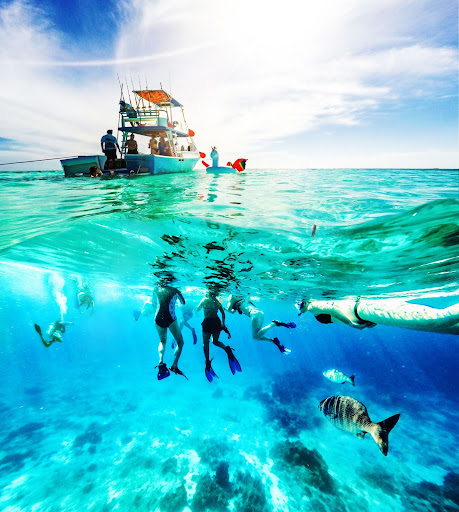
If you want to take a guest-focused approach to your tour business — as we recommend you do — then the quality of every tour guide is key!
How to hire and train amazing tour guides and leaders?
Leading a tour is more than just being able to rattle off a few facts about a place. A great tour guide must be engaging, enthusiastic, and able to keep their group safe and on schedule. They must also be able to think on their feet, handle difficult questions, and deal with difficult people. As tour operators, how do you go about recruiting and training world-class tour guides? Read on!
When tour businesses are recruiting tour guides, the key to success starts with profiling the ideal candidate.
Profile Your Ideal Tour Guide
If an absolute rockstar candidate walked through your door right this moment, would you know it? You know, the kind of person with all the right skills plus a perfect fit for your company culture? If you’re not 100% confident you would, we suggest you spend time profiling your best-fit candidate.
We suggest you consider broadly profile-matching the guides to your ideal guest. Here’s why — if your ideal guests are 25-year-old hipsters from New York, they’re unlikely to be attracted to a tour led by old-fashioned retirees. Humans tend to like those who are like us. That might seem like a generalization, but it’s generally true.
When profile-matching, you should consider attributes in two main categories:
- Demographics (age, gender, education, life stage)
- Psychographics (attitudes, aspirations, lifestyles, values)

In addition to demographics and psychographics, you’ll also want to consider:
- Any certifications, qualifications or licenses that would be ideal for the candidate to already hold.
- Any skills that the local tour guide needs to be successful, such as public speaking, storytelling, listening, rock climbing, cooking or bike riding.
- Any personality or character traits that a world-class tour guide should possess, such as a good sense of humor, a passion for people, reliability, confidence and patience.
Next, you need to write a compelling job description.
How to write a compelling tour guide job description
A compelling job description needs to be clear, concise, and easy to read. Here are a few tips to help you write a great tour guide job description:
1. Start with a brief overview of the position.
2. Clearly state the duties and job responsibilities.
3. Describe the ideal candidate for the position.
4. Describe what it’s like to work for your tour business.
5. Include a call to action at the end of the job description.
With a great job description, you can attract the best candidates for the role. Here’s an excellent example from Alaska Icefield Expeditions. We strongly recommend leaving your job postings on your website permanently. After all, if the perfect candidate applied, you’d find them a position somehow, right?
After you’ve written a job description, you need to develop the equivalent of a marketing plan to promote your job opening.
How to attract the best guides to your tour company
Your ideal candidate marketing plan might include:
- Listing the vacancy on job boards, including niche sites like GoAbroad, Coolworks, and Travel Massive, and any other places listing tour guide jobs. Also, keep an eye out for other sites that have similar job postings and list there, too.
- Launching an employee referral program. Offer an incentive if one of your current employees refers someone who is subsequently hired to lead your guided tours.
- Recording a video of the soon-to-be supervisor of the candidate outlining the role and inviting applicants to apply. Add a couple of testimonials from current employees to the end of the video. Upload the video to your chosen job boards and also to your social media profiles.
- Developing an employee value proposition (EVP). An EVP is a bundle of benefits that an employee receives from a company.
- Developing credibility as an ‘employer of choice’ with a Great Place to Work certification and Indeed reviews, for example.
- Setting up a LinkedIn Company Page to keep in touch with past employees and as a way to engage with future employees.
Make sure you respond promptly when good candidates apply. In a tight labor market, waiting days before contacting good candidates is too long. Treat candidates like your most profitable tour guests even if you only see the person leading a few tours for you. Tour companies are now competing for guides as much as they are guests.

Critically, recruit people who not only have the right skills, but also the right values and attitude. By doing so, you will be fostering a great culture as your tour company expands.
Should you use a recruitment or placement agency to hire tour leaders?
There is no one-size-fits-all answer to this question. It depends on your needs and preferences. If you have the time, resources, and expertise to do the hiring yourself, you may not need to outsource this process to a recruitment agency. However, if you want to save time and energy, or if you lack experience in hiring suitable candidates, a recruitment agency can be a useful tool.
What are the benefits of using a recruitment agency?
There are several benefits of using a recruitment agency. First, they can save you time and energy by finding candidates for you. Second, they can help you find qualified candidates who are a good fit for your company. Third, they can provide support and expert advice throughout the hiring process. Given the tight labor market, many tour companies are turning to recruitment agencies for their hiring needs.
What are the drawbacks of using a recruitment agency?
Firstly, they can be expensive. Secondly, you may not have as much control over the hiring process as you’d prefer. Lastly, you may not get to know the candidates as well as you would if you were doing the hiring yourself.
How much does it cost to use a recruitment agency, and is it worth the investment?
If you’re thinking about using a recruitment agency to hire your guides, you might be wondering how much it will cost. The short answer is that it depends on the agency and the specific job you’re looking to fill.
I have used a budget-friendly recruitment agency that charged a flat fee of $1,995 per position, which included advertising the job and short-listing candidates for a final interview.
I have also used big brand agencies that charged 10% of the remuneration package being offered to the candidate. So, if you were offering a package totaling $35,000, then the agency charged a placement fee of $3,500.
Generally speaking, however, it’s worth considering the investment if you’re having difficulty finding qualified candidates on your own or if the role is specialized and involves leading a particularly diverse group, requires very specific historical knowledge, for example, or you’re really committed to hiring great tour guides regardless of the cost.
If you decide to use a recruitment agency, be sure to ask about their fees upfront so there are no surprises. You should also ask about their process for screening candidates and whether they have any guarantee or refund policy in place. You’ll also want to know what is and isn’t included in their service. For example, do they eliminate candidates based on reviewing their resumes or do they interview all potential candidates. Do they provide any ongoing training or professional development?
In the end, the decision of whether or not to use a recruitment agency is up to you. If you’re able to find good candidates on your own, you may want to save the money and go that route. However, if you’re running short on time and the first tours of your season are fast approaching, then a helping hand from a recruitment agency might be a wise decision.
Should you use a recruitment agency when looking for other types of employees as well, such as customer service staff or salespeople?
Similar considerations apply to other positions you might have vacant, such as customer service staff or if you’re seeking an operations manager.
When choosing a recruitment agency, be sure to select one that specializes in the type of employee you are looking for. For example, if you need customer service staff, look for an agency that specializes in placing customer service employees. This will help ensure that the agency has a good understanding of the skills and qualifications required for the job, and can provide you with a pool of suitable candidates.
Ultimately, the decision of whether or not to use a recruitment agency depends on your specific needs, preferences, and budget.
How to conduct great job interviews
When you’re recruiting for any position, it’s important to conduct great job interviews. Here are some tips to help you:
1. Make sure you ask the right questions.
You’ll want to ask questions that will help you assess the candidate’s suitability for the job. For example, you could ask them about their experience leading amazing tours, their knowledge of the local area, and their customer service skills.
2. Take your time.
Don’t rush the interview process. Make sure you give each candidate enough time to answer your questions fully. You also want to allow time to see the candidates’ true personalities shine. After all, leading tours requires great people skills.
3. Listen carefully.
Pay attention to what the candidates are saying, and look for cues that will tell you whether they’re right for the job. Resist the temptation to talk too much. Simply ask a question, then remain silent until the candidate responds.
4. Follow up.
After the interview, take some time to follow up with the candidate. Ask them for feedback on the interview process, and let them know if they’ve been successful.
When you have identified the successful candidate, make sure to check their references, read reviews from past clients (if they’re an experienced guide) and check their social media accounts.
How to effectively onboard tour guides
Assuming you’ve already hired tour leaders that are a good cultural fit for your company, here are a few tips to help them hit the ground running:
1. Schedule an initial training day to review your company’s history, mission, and values, as well as key facts about the tour routes and attractions.
2. Assign a more experienced tour guide to serve as a mentor during the first few weeks on the job.
3. Encourage open communication by establishing regular check-ins and feedback sessions between guides and supervisors.
4. Help new guides get to know the local community by connecting them with resources that are helpful to the tour type, whether food tours, cultural tours, or any other format.
5. Finally, make sure to show your appreciation for a job well done with verbal praise, bonuses, and other forms of recognition.

Take advantage of online training resources
The finest guides are those who improve constantly. Continuing education is an important aspect of your curriculum. Use websites such as guestfocus.com to share training videos with others. Also, be on the lookout for online courses that your tour directors can take to improve their knowledge in specific areas and lead tours better.
How to keep tour leaders motivated?
After investing time and resources in obtaining a tour guide, it’s very costly to have them leave immediately. Unfortunately, this happens – especially during the holidays. Maybe they’re looking for other opportunities, or they’ve decided to move on to another location.

It’s essential to have a strategy to keep your guides motivated. Here are some tips:
1. Offering competitive pay is the most obvious way to keep your guides happy, but it’s not the only way. be sure to also offer other perks and benefits, such as flexible scheduling, paid time off, and health insurance.
2. Recognize and reward your tour leaders for a job well done. This could include verbal praise (as well as constructive feedback), bonuses, and other forms of recognition.

3. Schedule regular check-ins and feedback sessions between your guides and supervisors. Make sure your own tours are running well (perhaps with some mystery shopping). This will help build trust and keep communication lines open.
4. Help your tour guides feel like part of the team by involving them in decision-making and giving them a voice in the company.
5. Finally, make sure your guides feel like they are making a difference. This could include feedback from customers, or data showing the impact of their work on the company’s bottom line.
By following these tips, you can keep your tour guides motivated and ensure that they stick around for the long term.
How to troubleshoot common problems with tour guides
Even the best tour guides can run into problems from time to time. Here are a few tips for troubleshooting common issues:
1. If a tour guide is constantly arriving late, try to find out the root cause of the problem. Is there a specific reason why they’re running behind? If so, see if there’s anything you can do to help them out.
2. If a tour guide is having difficulty dealing with difficult customers, suggest role-playing exercises or other training opportunities to help them improve their customer service skills.
3. If a tour guide seems to be struggling with the details and information surrounding the tour, offer additional resources or training opportunities to help them brush up on their knowledge. Just remember what it was like to be the ‘new person’. The more support you can provide early on, the better.
4. Finally, if a tour guide is consistently making mistakes, have a candid conversation to find out what’s going on. This could be a sign that they’re feeling overwhelmed and need some help.
By offering competitive pay and benefits, recognizing and rewarding a job well done, and helping tour guides feel like part of the team, you can keep them motivated and reduce the likelihood of problems.




